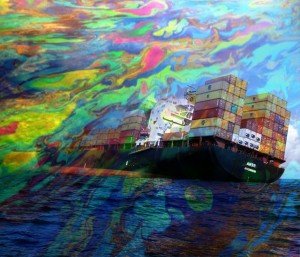The Rena grounding was the focus of a night of informal talks from experts at a cafe in Tauranga this month, bringing the science of the recovery effort to the people.
 Three experts spoke earlier this month at a Cafe Scientifique gathering in Tauranga, the epicenter of the Rena recovery. Cafe Scientifique is an international grass roots movement characterised by public talks on science in informal settings such a bars and cafes. The Rena science presentations were held at cafe Alimento in Tauranga on the 21st of November.
Three experts spoke earlier this month at a Cafe Scientifique gathering in Tauranga, the epicenter of the Rena recovery. Cafe Scientifique is an international grass roots movement characterised by public talks on science in informal settings such a bars and cafes. The Rena science presentations were held at cafe Alimento in Tauranga on the 21st of November.
Speakers
At the gathering, Mr Andrew Berry, who leads the Salvage Operations for Maritime New Zealand, discussed the logistics of the recovery and clean-up effort and some of the issues surrounding the salvage of the ship.
He was followed by Geophysics Professor Mal Heron from James Cook University, whose work on high frequency radar placed him in a convenient position to monitor oceanographic data following the grounding of the Sheng Neng in Australia.
Finally Professor Chris Battershill, Chair in Coastal Science at the University of Waikato talked about the biological impactof the grounding and the effects of the oil slick on Bay of Plenty ecosystems.
You can read more about the event here.
Organiser Dr Kathrin Otrel-Cass, Centre for Science & Technology Education Research (CSTER), University of Waikato, kindly provided the Science Media Centre with audio of the presentations, embedded below.
Mr Andrew Berry, Maritime New Zealand
Prof Mal Heron, James Cook University
Prof Chris Battershill, University of Waikato